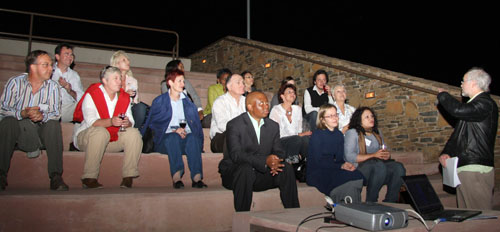Latest News Archive
Please select Category, Year, and then Month to display items
02 January 2025
|
Story Gerda-Marie van Rooyen
|
Photo Supplied
 Leading the research in South Africa is Prof Linus Franke from the Department of Soil, Crop and Climate Sciences.
Leading the research in South Africa is Prof Linus Franke from the Department of Soil, Crop and Climate Sciences.
Scientists are actively pursuing the successful breeding of diploid hybrid potatoes from inbred lines. This is expected to revolutionise potato breeding as it holds the key to rapid genetic progress. It will introduce new varieties for commercialisation through seed. Currently, existing potato variants have a gene that renders self-pollinated seeds infertile.
Prof Linus Franke, an academic in the Department of Soil, Crop and Climate Sciences at the UFS, is leading the research in South Africa. “This technology allows the production of genetically uniform potato seed that is easy to transport and largely disease-free.” He says this differs from conventional breeding whereby only vegetative propagation is possible due to tetraploid varieties in potatoes. It also risks carrying pests and diseases from one generation to the next – leading to the accumulation of pests and diseases with each round of multiplication.
Seed innovation
Prof Franke explains that Solynta BV, a seed company based in the Netherlands that produces potato varieties that can be grown from seed, has included South Africa in their research efforts because it is one of Africa’s largest producers and exporters. Through his academic relationship with Wageningen University and Research, a Dutch institution renowned for its agricultural endeavours and food production, the UFS became involved in researching hybrid potatoes grown from seed.
Diploid seeds containing two sets of chromosomes allow easier gene manipulation to increase predictability and speedier genetic progress. The breeding approach enables the incorporation of tolerance to pests, diseases, abiotic stresses (cold, heat, drought) and other desired genetic traits.
Although Prof Franke is optimistic about this research, he is not blind to disadvantages. “Potato seeds are tiny and have little energy reserves, making it harder to grow potatoes from seed than from tubers.” He says potatoes from seed will take longer to cultivate than tubers, as farmers need to grow plantlets from seeds first, adding six weeks to the growing period. “It is possible that commercial farmers can grow potatoes directly from seed. Alternatively, perhaps more likely, specialised growers will produce tubers of potatoes from seed; these tubers are then sold as seed tubers to other potato farmers, who then continue their normal practices of producing potatoes for the market from tubers.”
Financial benefits
Prof Franke says farmers have reason to get excited. “Seed potatoes will reduce input costs, as varieties with enhanced tolerance to pests and diseases require less pesticides. Planting one hectare of potatoes requires three to four tonnes of potato tubers, but only one 25 g packet of potato seeds.” Since potatoes are a more valuable commodity than maize, this technology might also increase farmers’ income potential.
Gauteng business community experiences UFS
2010-09-23
 |
|
Prof. Matie Hoffman from the Department of Physics of the UFS, presenting at the Boyden Observatory to a group of business executives from Gauteng, during their recent visit to the university.
Photo: Gerhard Louw
|
The University of the Free State’s (UFS) Corporate Liaison Office recently hosted a group of eleven business men and women from the private sector in Gauteng on its Main Campus in Bloemfontein. The purpose of the campus visits, which are held two to three times a year, is to give representatives from the corporate sector the opportunity to get to know the UFS first-hand and to help build the brand of the university as a national asset.
During their visit the group of business men and women, amongst others, met with faculty members, they enjoyed a networking session with UFS staff at the Oliewenhuis Art Museum, visited the Unit for Students with Disabilities as well as the Department of Paediatrics and Child Health.
The day ended at the Boyden Observatory where a feedback session was facilitated by Prof. Jonathan Jansen, Rector and Vice-Chancellor, and Prof. Ezekiel Moraka, Vice-Rector: External Relations. After this opportunity where the visitors discussed their experience of the UFS, the day came to an end with a presentation on: The African skies: Stories and science by a Ph.D. candidate from the Department of Physics, Mr Bosco Oruru. One of the highlights of the evening included a sighting of the Hubble Telescope in the sky over Bloemfontein and observing the moon and Venus through one of the Boyden telescopes.
The visitors left with new insights and a great appreciation for the contribution of the UFS to education, research and community service in South Africa.